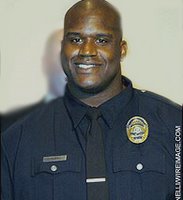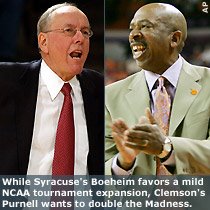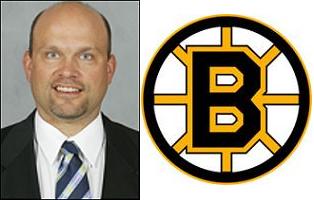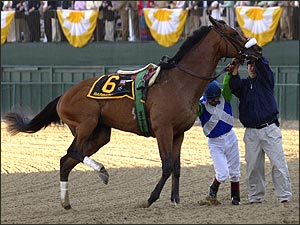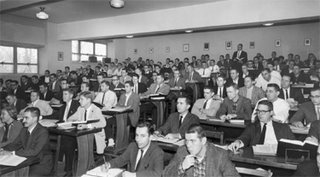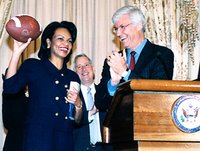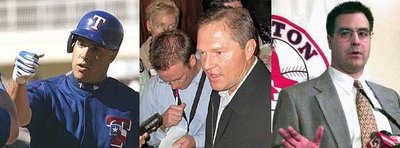
With the Major League Baseball amateur draft to be held in two weeks (June 6-7), Alan Schwarz of
Baseball America has a
very interesting interview with Texas Rangers first baseman
Mark Teixeira. In the interview, Teixeira recalls when the Boston Red Sox drafted him in the 9th round of the 1998 MLB Draft, as well as communications between the Sox and Teixeira prior to the draft. Like many of the draft's best prospects, Teixeria, then 18, was represented by super-agent
Scott Boras. After a very contentious negotiation with then-Red Sox GM
Dan Duquette, Teixeria declined to sign, feeling low-balled by Duquette's offer of a $1.5 million signing bonus, and instead chose to attend Georgia Tech. Three years later, the Texas Rangers selected him in the 1st Round (5th overall) of the 2001 MLB Draft, signed him to a
$10.5 million contract (including a $9.5 million bonus), and he has gone on to become a big league star.
In the interview, Teixeira suggests that the Red Sox sabotaged his draft status by (1) engaging in what he calls "illegal" pre-draft negotiations with his agent; (2) slandering him, albeit privately; and (3) drafting him relatively late (in the 9th round) in order to diminish his superstar prospect reputation. Here is the relevant portion of the interview (with my italics):
Alan Schwarz: The Red Sox offered you $1.5 million before the draft, which was pretty darned fair in 1998.
Mark Teixeira: They said take it or leave it. It was a decent bonus, but it wasn't what we were looking for, and we didn't want to cap our negotiation before the draft even happened. It's unfair and illegal to go to a kid and say, "We haven't drafted you yet, we may or may not draft you, but if you don't take 1.5 we're not going to draft you." What would you say? There's 29 other teams out there--why would I ever cap myself before the draft even happens? It doesn't make any sense. It's unfair to those kids. Say, "Draft me and I'll let you know."
I have a very cynical approach toward the draft. I was naive. It was my first realization to the business in baseball. The Red Sox told everybody that I wouldn't sign, and when it got to a late enough round, they said, "Let's take a flier on him." So they spoiled me for everyone else--the only one that would draft me was them.
First off, I'm not feeling much sympathy for Mr. Teixeira. Any player, of any age, who hires Scott Boras to represent him is clearly not "naive" about baseball "being a business."
Second, I don't buy that the pre-draft negotiations between Boras and the Sox were in any way "illegal" or inappropriate. It's not entirely clear what laws Teixeira thinks the Red Sox broke, but he might be suggesting that the Sox, by telling other teams that Teixeira wouldn't sign for $1.5 million, tortiously interfered with his prospective relationships with those teams. Or perhaps he believes that the Sox slandered him when talking to other teams, or even that it libeled him by drafting him so late. Even more quixotically, he might think that the Sox bargained in bad-faith by threatening to not draft him unless he acquiesced to a $1.5 signing bonus (oh the horror!) or even--bear with me--that the Sox extorted him (something to the effect of, "Mark, if you don't agree to $1.5 million, we'll make sure that other teams find out about that . . . and we'll do that because we are so evil!"). Alternatively, if Teixeira simply believes that the mere
act of pre-draft negotiations by the Sox was illegal, then why was his agent engaged in those same negotiations on his behalf?
The reality is that pre-draft negotiations are common with marquee players. In theory, such negotiations violate MLB tampering rules, but those rules are not enforced for good reason: they enable players to better assess whether they should pack for freshman year or pack for life as a minor-leaguer, and they enable teams to better assess whether it is in their baseball
and financial interests to draft a particular player. And to the extent Teixeria or any player is hurt by these pre-draft negotiations, they should blame their agent, not the team that didn't assent to their asking price.
Having said all that, if there is evidence that a team has willfully damaged a player's reputation, either by published words (libel) or spoken words (slander), then a player would have legal recourse. But I suspect that most players don't have that evidence, and are instead just embittered that big league teams didn't think as highly of them as they did of themselves.
 It's been widely reported today that cyclist Lance Armstrong, to be blamed for starting the rubber bracelet fad, has been cleared by Dutch lawyer Emile Vrijman of charges of doping in connection with the 1999 race. Armstrong has taken Vrijman's findings as a sign of his absolute innocence, although Vrijman's findings actually seem a bit more cautious. Vrijman concludes that the lack of a "confirmation" test rendered the lab work on Armstrong's samples insufficient from a procedural perspective. That is to say, Vrijman doesn't seem to have concluded that Armstrong's samples were free of EPO, just that the procedures weren't sufficient to make a case for a doping violation. I look forward to reading Vrijman's report, which I haven't been able to find on-line so far.
It's been widely reported today that cyclist Lance Armstrong, to be blamed for starting the rubber bracelet fad, has been cleared by Dutch lawyer Emile Vrijman of charges of doping in connection with the 1999 race. Armstrong has taken Vrijman's findings as a sign of his absolute innocence, although Vrijman's findings actually seem a bit more cautious. Vrijman concludes that the lack of a "confirmation" test rendered the lab work on Armstrong's samples insufficient from a procedural perspective. That is to say, Vrijman doesn't seem to have concluded that Armstrong's samples were free of EPO, just that the procedures weren't sufficient to make a case for a doping violation. I look forward to reading Vrijman's report, which I haven't been able to find on-line so far.
